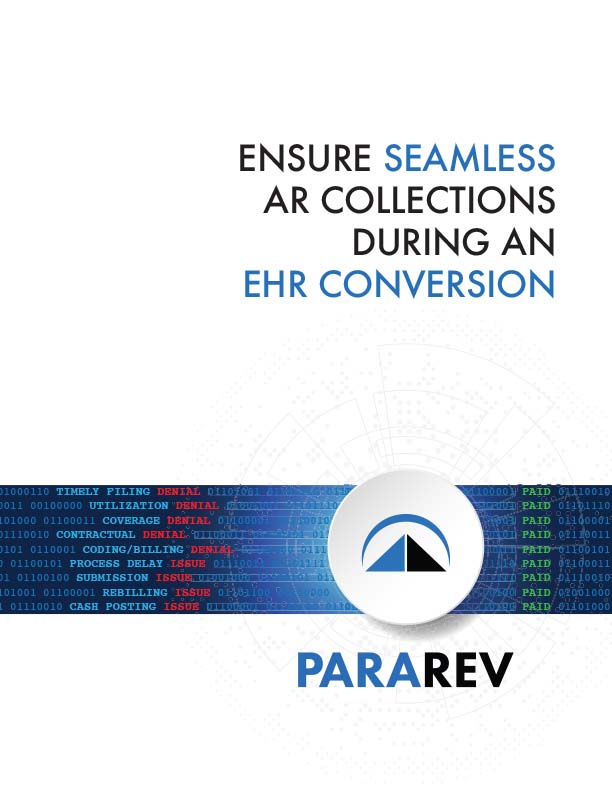Like costly home improvement projects gone awry, electronic health record (EHR) and revenue cycle management software implementations don’t always pan out as intended for hospitals and health systems. But with the right tools and proper planning, potential issues can be minimized.
Several troubled EHR or revenue cycle software installations have recently underscored the enormous financial risks hospitals face when deploying information systems that generate mission-critical claims and billing data.
The costly missteps highlight the importance of adopting a two-prong approach for handling accounts receivable (AR) during and after a system conversion. By assigning internal staff with just new system billing activities, provider organizations allow in-house personnel to more quickly develop the skills required to submit claims in an accurate and timely manner.
Legacy accounts, meanwhile, can be outsourced to a qualified, third-party AR recovery and resolution vendor that specializes in AR conversion projects. This approach not only reduces the burden on internal staff, but also helps ensure aging denials will be worked thoroughly and consistently to resolution.
AR Financial Issues
Hospitals can easily encounter financial challenges if major problems surround the implementation of systems that collect not only clinical information but billing and financial data as well. Consider these recent situations:
- Glen Falls Hospital, in Glen Falls, New York, lost $38 million in 2017 as the direct result of problems surrounding an EHR deployed in August 2016. The new system replaced several legacy EHR platforms.[1]
- The former management company of Tulare Regional Medical Center in Tulare, California, cited problems with the hospital’s EHR implementation as partly responsible for ongoing cashflow problems that led the medical center to file for bankruptcy in 2017.[2]
- An EHR implemented at Western Missouri Medical Center in Warrensburg, Missouri, in 2016 “created a multitude of issues,” including the inability to bill patients in a timely manner. The hospital hired a third-party firm to help overcome its billing problems in 2018 and said it would likely write off several hundred thousand dollars in aging, unsubmitted patient bills.[3]
- In Tennessee, Vanderbilt University Medical Center said an EHR implementation “put pressure on clinical volumes in the post-live period” that contributed to a $66 million reduction in operating income in fiscal 2018.[4]
- Agnesian Healthcare Inc. in Wisconsin sued an EHR vendor in 2017, alleging the company’s scheduling, billing and claims software was responsible for “pervasive errors” that led to more than $16 million in losses.[5]
Reducing risk
The success of a major IT implementation obviously is contingent on a multitude of factors, some of which may be beyond the control of the hospital. Nonetheless, hospitals can take steps to reduce their exposure by tasking a third-party with legacy AR accounts ahead of the deployment.
ParaRev specializes in legacy AR recovery and resolution. HFRI, a leader in accounts receivable recovery and resolution, works as a virtual extension of your hospital central billing office to help you resolve and collect more of your insurance accounts receivable faster and improves operating margins through a seamless and collaborative partnership with your internal team.
ParaRev utilizes proprietary intelligent automation and staff specialization to efficiently process all claims regardless of size or age. Clients can gain a 25% improvement in resolution cycle time and cash recovery rates that often exceed 75% on problematic AR claims — double the performance of most legacy AR management vendors.
In addition to our resolution capabilities, ParaRev also can provide denial management assistance by conducting root cause analysis and recommending process improvements to help decrease aged and denied claims going forward. Importantly, ParaRev is HITRUST CSF-certified to help ensure the highest levels of protected health information (PHI) security and compliance.
Hospitals and health systems need to do whatever is necessary to reduce financial risk ahead of major EHR or revenue cycle system implementation projects. By partnering with ParaRev for AR conversion projects, you’ll be able to focus on the new deployment, confident in the fact that legacy AR accounts will be resolved fully and effectively.
- Kate Monica, “Billing Problems Caused By Cerner EHR Costs NY Hospital $38M,” EHR Intelligence, March 18, 2019.
- Kate Monica, “Cerner EHR Partly Blamed for Hospital Billing Issues, Bankruptcy,,” EHR Intelligence, April 20, 2018.
- Kate Monica, “Cerner Implementation at MO Hospital Causing Billing Problems,,” EHR Intelligence, Feb. 28, 2018.
- Jacqueline LaPointe, “VUMC Sees Operating Income Decrease After EHR Implementation, RevCycle Intelligence, May 30, 2018.
- Kate Monica, “WI Health System Suing Cerner for $16M for Faulty Software,” EHR Intelligence, Sept. 25, 2017.

Protect your cash flow and reduce AR risk throughout your EHR transition. Learn how by downloading our whitepaper.
Related Posts
None found
